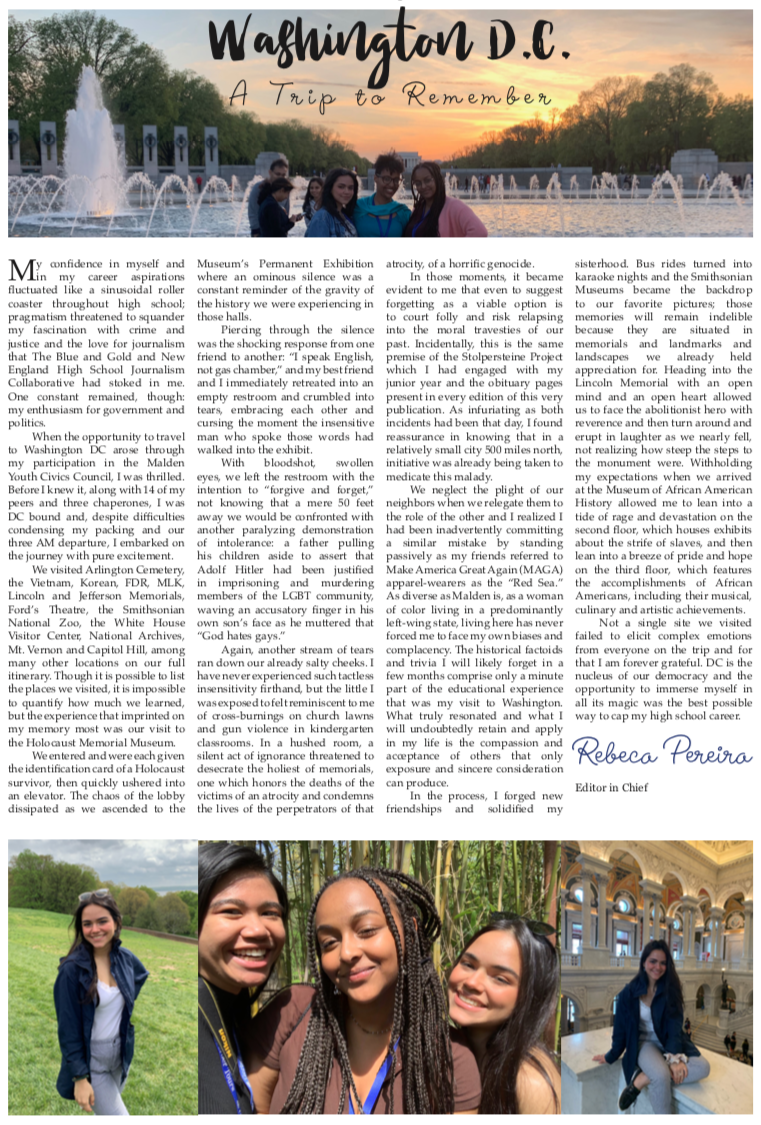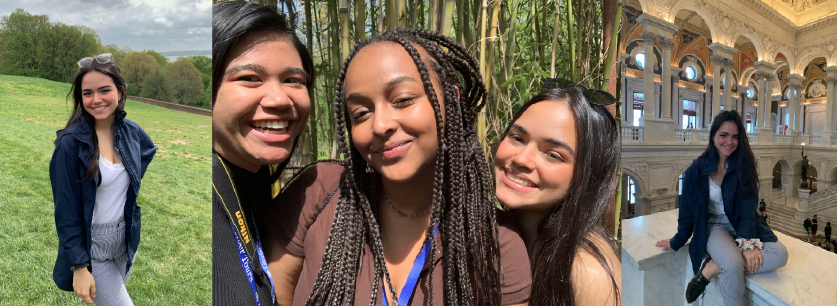
My confidence in myself and in my career aspirations fluctuated like a sinusoidal roller coaster throughout high school; pragmatism threatened to squander my fascination with crime and justice and the love for journalism that The Blue and Gold and New England High School Journalism Collaborative had stoked in me. One constant remained, though: my enthusiasm for government and politics.
When the opportunity to travel to Washington DC arose through my participation in the Malden Youth Civics Council, I was thrilled. Before I knew it, along with 14 of my peers and three chaperones, I was DC bound and, despite difficulties condensing my packing and our three AM departure, I embarked on the journey with pure excitement.
We visited Arlington Cemetery, the Vietnam, Korean, FDR, MLK, Lincoln and Jefferson Memorials, Ford’s Theatre, the Smithsonian National Zoo, the White House Visitor Center, National Archives, Mt. Vernon and Capitol Hill, among many other locations on our full itinerary. Though it is possible to list the places we visited, it is impossible to quantify how much we learned, but the experience that imprinted on my memory most was our visit to the Holocaust Memorial Museum.
We entered and were each given the identification card of a Holocaust survivor, then quickly ushered into an elevator. The chaos of the lobby dissipated as we ascended to the Museum’s Permanent Exhibition where an ominous silence was a constant reminder of the gravity of the history we were experiencing in those halls.

Piercing through the silence was the shocking response from one friend to another: “I speak English, not gas chamber,” and my best friend and I immediately retreated into an empty restroom and crumbled into tears, embracing each other and cursing the moment the insensitive man who spoke those words had walked into the exhibit.
With bloodshot, swollen eyes, we left the restroom with the intention to “forgive and forget,” not knowing that a mere 50 feet away we would be confronted with another paralyzing demonstration of intolerance: a father pulling his children aside to assert that Adolf Hitler had been justified in imprisoning and murdering members of the LGBT community, waving an accusatory finger in his own son’s face as he muttered that “God hates gays.”
Again, another stream of tears ran down our already salty cheeks. I have never experienced such tactless insensitivity firsthand, but the little I was exposed to felt reminiscent to me of cross-burnings on church lawns and gun violence in kindergarten classrooms. In a hushed room, a silent act of ignorance threatened to desecrate the holiest of memorials, one which honors the deaths of the victims of an atrocity and condemns the lives of the perpetrators of that atrocity, of a horrific genocide.
In those moments, it became evident to me that even to suggest forgetting as a viable option is to court folly and risk relapsing into the moral travesties of our past. Incidentally, this is the same premise of the Stolpersteine Project which I had engaged with my junior year and the obituary pages present in every edition of this very publication. As infuriating as both incidents had been that day, I found reassurance in knowing that in a relatively small city 500 miles north, initiative was already being taken to medicate this malady.
We neglect the plight of our neighbors when we relegate them to the role of the other and I realized I had been inadvertently committing a similar mistake by standing passively as my friends referred to Make America Great Again (MAGA) apparel-wearers as the “Red Sea.” As diverse as Malden is, as a woman of color living in a predominantly left-wing state, living here has never forced me to face my own biases and complacency. The historical factoids and trivia I will likely forget in a few months comprise only a minute part of the educational experience that was my visit to Washington. What truly resonated and what I will undoubtedly retain and apply in my life is the compassion and acceptance of others that only exposure and sincere consideration can produce.

In the process, I forged new friendships and solidified my sisterhood. Bus rides turned into karaoke nights and the Smithsonian Museums became the backdrop to our favorite pictures; those memories will remain indelible because they are situated in memorials and landmarks and landscapes we already held appreciation for. Heading into the Lincoln Memorial with an open mind and an open heart allowed us to face the abolitionist hero with reverence and then turn around and erupt in laughter as we nearly fell, not realizing how steep the steps to the monument were. Withholding my expectations when we arrived at the Museum of African American History allowed me to lean into a tide of rage and devastation on the second floor, which houses exhibits about the strife of slaves, and then lean into a breeze of pride and hope on the third floor, which features the accomplishments of African Americans, including their musical, culinary and artistic achievements.
Not a single site we visited failed to elicit complex emotions from everyone on the trip and for that I am forever grateful. DC is the nucleus of our democracy and the opportunity to immerse myself in all its magic was the best possible way to cap my high school career.




